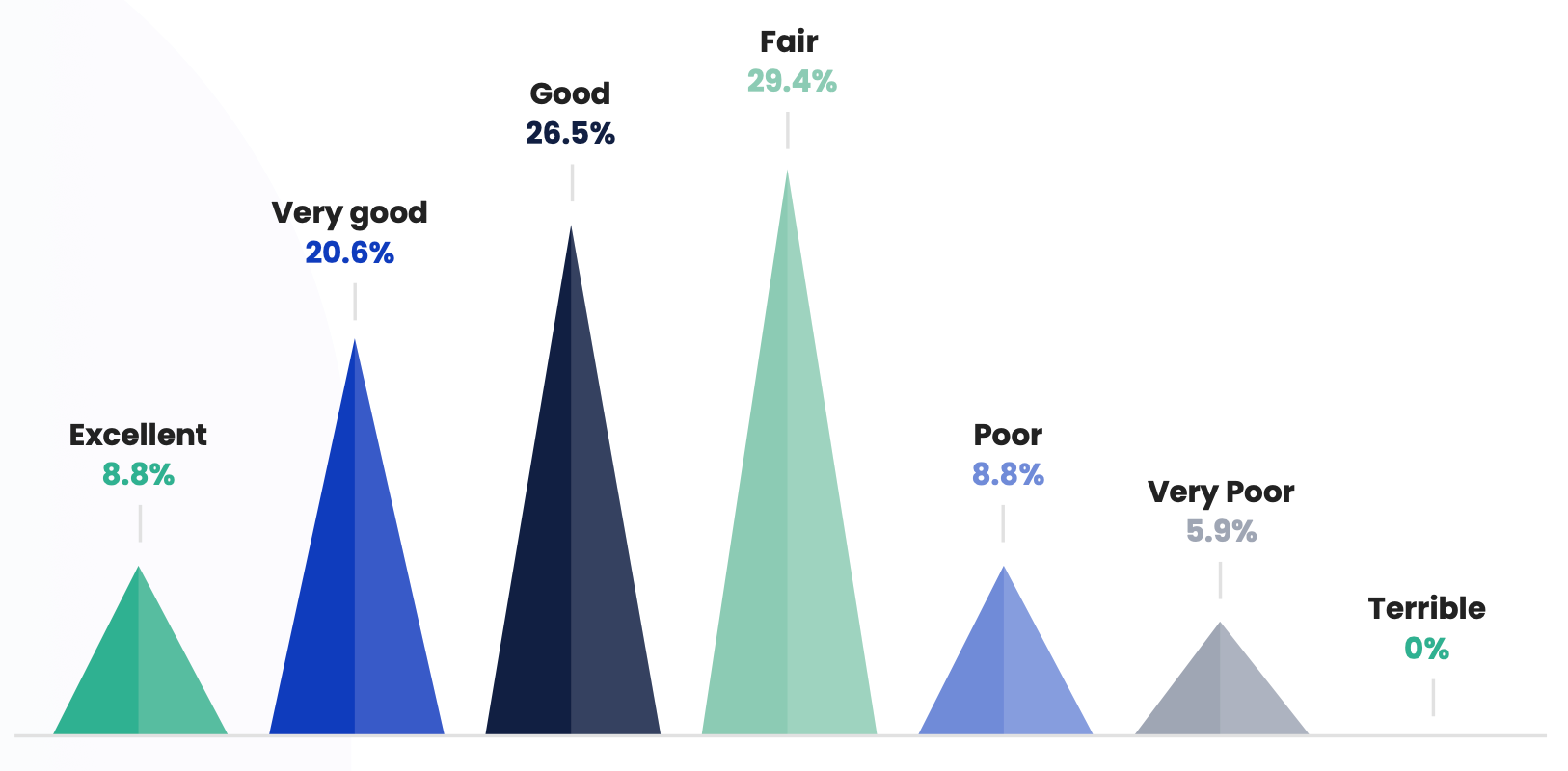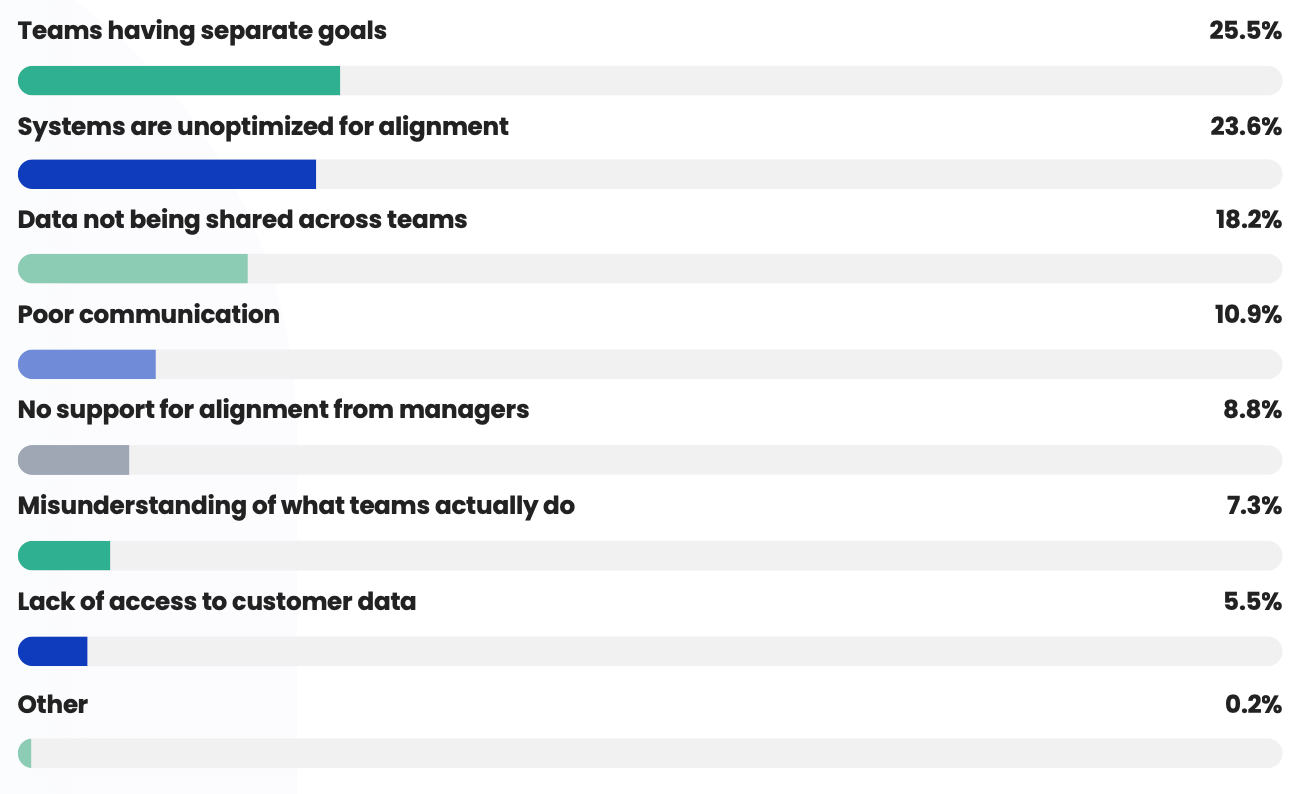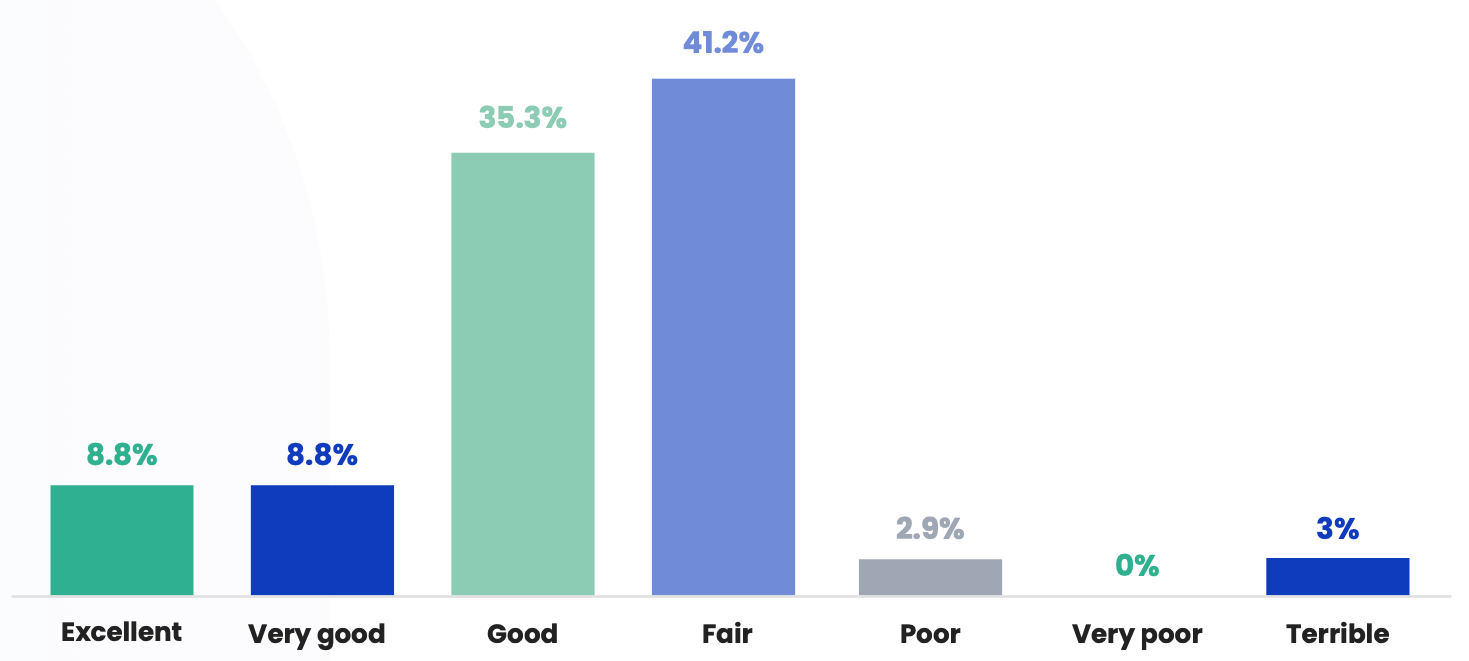Misaligned sales and marketing teams can spell disaster for an organization's revenue goals. But how can you get these critical departments, with their unique priorities and incentives, to work together seamlessly?
Our latest State of Revenue Marketing report sheds light on this issue.
After surveying and collecting responses from marketers across different industries, locations, customer bases, and growth stages, we uncovered illuminating data on the current state of revenue marketing.
In this guide, we'll uncover the pain points teams face when aligning sales and marketing.
You'll learn how revenue marketers rate alignment at their companies, the biggest challenges to collaboration, and the processes helping teams better communicate and coordinate strategies.
Why is sales and marketing alignment important?
Though they play different roles, alignment between these two critical departments can make or break an organization's success.
Marketing focuses on top-of-funnel strategies to attract and engage potential buyers. The team runs branding campaigns, creates content, and generates inbound leads. But that's only half the battle. For leads to convert to sales, there needs to be a handoff to the sales team. This is where tight alignment pays off.
This symbiotic relationship allows for more relevant, personalized outreach. Buyers feel understood and sales cycles shorten. The result is more closed deals and accelerated revenue growth.
In fact, aligning sales and marketing departments can generate 208% more revenue from marketing campaigns. But, many companies feel their marketing and sales teams are yet to achieve alignment.
This made us curious as to how revenue marketers viewed marketing and sales alignment at their organization.
How do marketers rate their current sales and marketing alignment?
To gain an understanding of how good the alignment of the sales and marketing teams is at an organization, we asked our respondents to rate it at their company.
8.8% said it was “excellent,” 20.6% said it was “very good,” 26.5% said it was “good” and 29.4% said it was “fair.” Only 14.7% of respondents said that it was either “poor” or “very poor.”

The biggest challenges of achieving sales and marketing alignment
Aligning marketing and sales – two of the largest departments in any organization – can present challenges. These challenges can come in many forms, whether it’s having different goals, poor communication, not having a clear understanding of what other teams do, and so on.
We asked our revenue marketing participants what their biggest challenge was to gain alignment between these two teams.
The winner, so to speak, was “teams having separate goals.” Over 25% of our respondents noted this as the greatest barrier. This was closely followed by “systems are unoptimized for alignment” (23.6%), “data not being shared across teams” (18.2%), and “poor communication” (10.9%).

N.B. Respondents were able to select more than one answer for this question.
We asked Eve Chen, The Growth Engine Founder, and Principal Consultant, what she thought of these stats. She said:
“In the realm of revenue marketing, the true strength lies in the harmonious collaboration between marketing and sales, where campaigns are purposefully woven to achieve organizational revenue goals.
“Alas, the 2023 State of Revenue Marketing survey unveils a sobering truth - 67.5% of companies face formidable challenges in aligning their sales and marketing efforts at the goal, system, and data levels.
“A glaring revelation emerges: The absence of a dedicated revenue marketing driver further fuels this misalignment, serving as a pivotal barrier for B2B organizations to overcome."
We also asked Nic Zangre, VP of Customer Success and Revenue Operations at CaliberMind. He said:
“Team alignment around KPIs and Goals is paramount. The concept of revenue marketing enables shared charters across marketing, sales, and customer success teams. The top three challenges to alignment we found were: siloed goal setting (25.5%), siloed systems (23.6%), and siloed data (18.2%).
“These challenges can be alleviated by collaboration and selecting unified systems to enable measuring unified goals. Access to data across the enterprise has never been more critical.
"If your marketing team neither shares a revenue goal nor understands pipeline creation at your company, you will get left in the dust!”
What processes facilitate alignment between marketing and sales?
But we didn’t want to leave it there. It was important to us to find a solution to these challenges as well. What infrastructure, processes, or tools should be in place to support sales and marketing alignment?
To foster alignment, sales and marketing teams need to work hand-in-hand to understand ideal customer profiles (ICPs) and create targeted campaigns that speak to customers’ needs. You can utilize predictive analytics and aim to quantify results wherever possible, allowing you to optimize your strategies.
“We utilize Marketo, ZoomInfo, and RingLead with Salesforce as just some of the core tools central to ensuring we have thoughtful and robust demand gen and ABM campaigns to not only drive new revenue and net new leads for the company but also help move existing leads and opportunities down the funnel and downstage.”
Annie Furlong, Senior Director and Head of Marketing at Cleo Labs
Regular check-ins ensure continued collaboration. Sales and marketing leaders should meet regularly – biweekly, for example – to review data and insights that inform campaign and strategy adjustments.
Cross-functional meetings help, too. Alignment doesn’t have to just occur between sales and marketing teams – bring in customer success to align all teams on the latest content, messaging, and tools that’ll enable sales conversations.
Maintaining open communication channels drives consistency across outreach efforts and equips sales with what they need to move opportunities forward. The result? You can expect to experience increased pipeline and revenue powered by tightly aligned go-to-market motions.
“We create content together. Marketing helps with sales decks, sales help review ads and landing pages. This allows us to stay aligned on the main value props and key features we highlight to our potential customers.
It helps us communicate consistent value throughout the whole buyer journey: From the first marketing touch to the final buying decision against a competitor.
“We use the same definitions. Every company has a slightly different understanding of terms like MQL, SAL, or SQL. We have it documented and explained to every new person in the company.”
Yulia Olennikova, Head of Marketing at N.Rich
Communication is key to sales and marketing alignment
Communication among teams is an important part of any process. We wanted to see just how good the communication is between the sales and marketing teams at different organizations.
Most of our respondents seemed to be on the same wavelength, saying that the quality of communication was either “good” (35.3%) or “fair” (41.2%).

It’s a shame to see that, in some organizations, communication falls under the “poor” and “terrible” brackets. Hopefully, we’ll see this change in the future.
Biggest communication challenges in sales and marketing alignment
Without communication, it's hard to get anything done effectively within an organization. This applies particularly to aligning marketing and sales, as it hampers collaboration, coordination of strategies, sharing valuable insights, and the ability to address customer needs cohesively. These are vital to driving revenue growth.
We asked our revenue marketers what they believed to be the cause of poor marketing and sales communication. One respondent offered a succinct response of, “marketing leadership,” whereas another participant explained the issue in more detail:
“Working on teams and having to align two different teams to have the same goal in mind can be difficult because the teams are trying to prioritize their own intentions instead of coming together as one and making something great out of all the ideas.”
We considered this observation to be particularly interesting. After all, your organization should be working toward one goal. It’s very easy to hyper-focus on your own goals within your department, however, collaboration and communication with your other teams is crucial to meeting the company’s overarching goals – especially when it comes to increasing revenue.
So, how can you do this?
Processes for supporting communication between sales and marketing
Having highlighted the challenges revenue marketers can face when it comes to communication, we deemed it necessary to highlight how such problems can be remedied.
We asked what tools and processes our revenue marketers have in place to support sales and marketing communication at their organization. Here are the most popular responses:

We asked Ilias Tsatalmpasidis, Head of Growth at Superscript, what he believed sales and marketing need to engage with to boost their communication levels. He said:
“In my view, it’s all about building the trust that we’re all working with one common goal. Beat the misconception that we’re ‘fighting’ for credit or departmental success and budgets.
"All goals need to be connected and well-aligned. And above all, we make sure we celebrate each other’s contributions.”
Activities to improve sales and marketing alignment
We wanted to know what kind of alignment activities our respondents engage in at their companies to get marketing and sales on the same page.
The majority of participants said they hold regular joint meetings (88.2%), which has switched from last year’s most common activity of integrating tools that share data.

N.B. Respondents were able to select more than one answer for this question.
We were curious about whether a lack of these alignment activities contributed to a negative reporting of alignment and communication between the marketing and sales teams.
Interestingly, those who reported “poor” or “terrible” as their communication rating indicated the only inter-departmental communication was regular joint meetings between the teams, and nothing else.
From this data, it seems clear that good marketing and sales communication doesn’t happen with just regular meetings. There are multiple activities and processes that need to take place, like sharing “goals to work toward” together, getting input from sales into marketing materials, and more.
Sales and marketing alignment: Final thoughts
Aligning sales and marketing is no easy feat. With different goals, priorities, and incentives, these critical departments can often feel at odds. But revenue growth depends on a unified front.
As our data reveals, many companies still face challenges fostering true collaboration between sales and marketing teams. The insights show a lack of shared objectives, optimized systems, and open communication channels frequently obstruct alignment.
However, progress lies in establishing cross-functional processes. This includes regularly sharing data and insights, coordinating campaigns, and ensuring messaging consistency across touchpoints.
With marketing empowering sales with insights and content, and sales providing feedback to optimize strategies, you can achieve cohesive cross-functional alignment, achieve your revenue-focused goals, and sustainable growth.



 Follow us on LinkedIn
Follow us on LinkedIn


